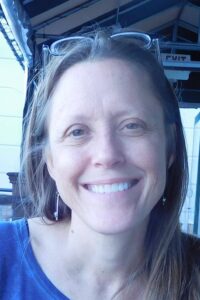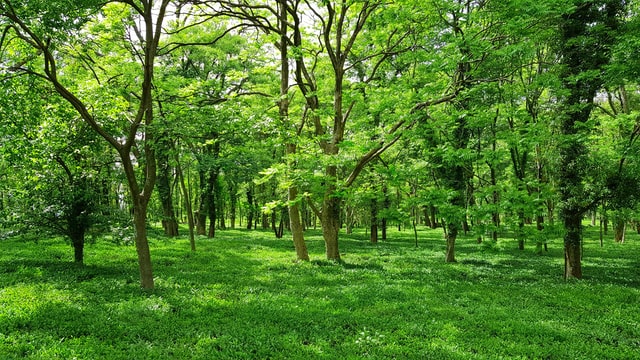Feminist Economists Bring Missing Pieces to the Puzzles We Strain to Solve for a More Just World
Recently, the Simpler OneEarth Living Podcast had a conversation with a feminist economist. It was so informing. Rich. Brenda Wyss (Weess), professor of Economics and Coordinator of Development Studies at Wheaton College in Norton, Massachusetts, explains how she and colleagues study and teach what’s missing in “orthodox” economics. Hear her answer to the question, “What is feminist economics?”
Studies at Wheaton College in Norton, Massachusetts, explains how she and colleagues study and teach what’s missing in “orthodox” economics. Hear her answer to the question, “What is feminist economics?”
With the newly released report from the Intergovernmental Panel on Climate Change (IPCC), evidence mounts that the current economic and political systems cannot deliver the social and ecological justice that is necessary to sustain life on our planet. Where then do we turn? Women are an obvious and undervalued source of economic wisdom and alternative. Women are creating systems that are far more just, and far more life-giving than the ones which currently bring catastrophic changes to the planet and most of life. Feminist economists are underused, even sidelined by “orthodox” economists. But with the new IPCC report, all ideas must be heard.
In her own words, Brenda says:
I am particularly interested in issues of economic justice; and I bring that commitment to my research, teaching, college service, and my life off campus. I strive to make economics exciting and accessible and to introduce students to a range of viewpoints, issues and questions often left out of economics courses. I’ve been teaching a course about women in the U.S. economy for 30 years. I also teach Foundations of Political Economy which highlights how power shapes the economy and economic outcomes.
I’ve worked with the Center for Popular Economics (CPE) since the 1980s, providing economic literacy training and analysis to social change activists and grassroots organizations.
Note: Amartya Sen is mentioned in this episode. Learn about his Nobel Prize-winning work on development and freedom.
Listen to Brenda Wyss on the Simpler Living OneEarth Podcast, a co-production of Simple Living Works! and OneEarth Jubilee. It’s available on our respective websites, at iTunes, or wherever you go for podcast listening.
Feminist Economics Put to Work by Jubilee Circles and Making a Difference
Many women feel they have no power economically, politically, or in segments of society other than mothering. In that perception of themselves, they cannot fully manifest the divine image or the power of the Spirit eager to work through them. In this situation, learning ways to put feminist economics into practice becomes a powerful spiritual exercise. The Jubilee Circles of San Mateo and San Cristobal are working with women to teach new skills and to translate them into social, political, and economic power. All the while, the women experience changes in their self-awareness, and they respond to the Spirit leading them into some new ways of living.
In San Mateo, women learned new skills as artisans and artists, got contracts for what they produced, and learned business and banking skills. In a new project, they will be learning baking skills that produce nutritious foods which they will sell in the community.
Similarly, in San Cristobal, the Jubilee Circle is training women on how to exercise their power as citizens to make changes that improve their neighborhoods. Other projects train women for leadership in congregations, organic growing of mushrooms, making healthy skin products, and much more. The weekly Plaza Comunitaria (self-organized farmer’s market) in San Cristobal facilitates a way to bring to market some of what they are learning.
Many times, the Circles hear women exclaim in surprise, “Look what I just did!” New awareness! A new sense of power! A sense that they are not endlessly bound by the rules made by men on how they are to live out their lives. A liberating spiritual way emerges.
Tree Planting: Sustainability in our Urban Forests, Informed by Science and Mindfulness
By John Michno

Photo by Ankit Choudhary on Unsplash
Trees give oxygen. Sequester carbon. Capture run-off, keep water close and prevent flooding.
Trees absorb sunlight. Reduce urban heat islands. Provide food. Beautify your day and bring you peace. Provide habitat to insects and birds.
How do we get more of that?
 I’ve been working with Master Gardener Robin Rivet to grow saplings in preparation for October planting. To find planting folk, Robin and I co-hosted an event on helping existing trees survive climate change. We were joined by data scientist Jeff Sale, from UCSD’s Supercomputer Center, Vickie Ficklin of the Buddhist community, and Norm Sirois of the Unity Center, all of whom plant trees in their backyard gardens and each of whom practice mindfulness from separate traditions. Robin took us on a tour of the garden at the Bancroft Center for Sustainability, showing us how tree grafting works. John showed how our urban forests are more sustainable with Tree Equity Scores. These scores enable localities to prioritize tree planting budgets based on community health needs, economic needs, and shade needs due to dangerously high heat.
I’ve been working with Master Gardener Robin Rivet to grow saplings in preparation for October planting. To find planting folk, Robin and I co-hosted an event on helping existing trees survive climate change. We were joined by data scientist Jeff Sale, from UCSD’s Supercomputer Center, Vickie Ficklin of the Buddhist community, and Norm Sirois of the Unity Center, all of whom plant trees in their backyard gardens and each of whom practice mindfulness from separate traditions. Robin took us on a tour of the garden at the Bancroft Center for Sustainability, showing us how tree grafting works. John showed how our urban forests are more sustainable with Tree Equity Scores. These scores enable localities to prioritize tree planting budgets based on community health needs, economic needs, and shade needs due to dangerously high heat.
Participants were concerned by Robin’s caution that 75% of trees are under duress from drought and other factors. They were also inspired by her call to preserve existing trees and plant new ones. “Can a tree destined for removal – be saved?” Robin was excited about a potential partnership with data scientists to map trees to increase survival rates. John appreciated the blend of scientific observation and mindful collaboration brought to our circle by Robin’s Quaker sensibility, Jeff’s Zen, Norm’s Heart Math, and Vickie’s Insight Buddhism.
In the coming months, we’ll share with you about our upcoming visit to Robin’s orchard to learn to cultivate fruit trees, along with a few photos. Stay tuned.





